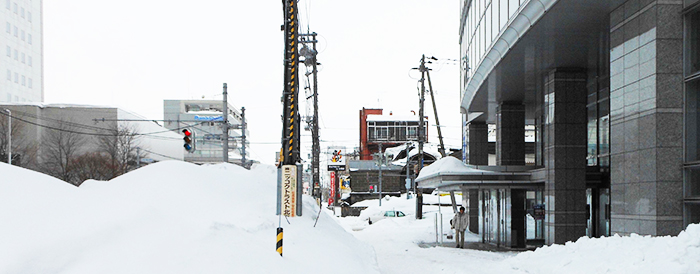Top of Page
- Links to move inside this page.
- HOME
- Sustainability
- IIJ Group's contributions to society
- Twork Helps Staff with Disabilities Work from Home
Twork Helps Staff with Disabilities Work from Home
The IIJ Group introduced Twork in 2011 as a program that allows staff with disabilities to work from home. At present, over 40 members take advantage of this program and work for IIJ Group's offices in the cities of Sapporo and Matsue.
Especially in winter around the office in Sapporo, textured paving blocks and curbstones that serve as direction signs are covered with snow and it is difficult to move in a wheelchair. Given the situation in regions subject to heavy snowfall, the Twork program for working from home is vital for staff with disabilities.

Snow coverage of three meters to be removed near the office
The Twork staff work at home with the use of video conferencing and chat tools to facilitate close communication. Staff members with disabilities form a team. They mutually check and support one another in carrying out their respective duties. Staff in the same Twork team provide work training.
Under the Twork program, they engage mainly in part of IIJ's human resources operations. They include arranging for the entry and retirement of employees, health checkups, management of health checkup receipt status and creation of reports on training and other measures for human resources. The scope of operations is expanding. The size of staff working under the Twork scheme is growing with each year. Team leaders communicate with representatives of the client organization. Staff members with technical skills are responsible for IT tool settings. They use their capabilities and qualities to expand the scope of their activities.

Ayumi Miyano
A staff member with physical disabilities and a wheelchair user, IIJ
When working from home, I can work without worries, since I am free from problems with commuting and equipment. At first, I was anxious about the means of communication such as e-mail and chat. However, I deliberately try to maintain close communication. Accordingly, I realized that in fact this style of work has many advantages. We will work together in our team to expand the scope of our work.

Hiromi Kumagaya
A staff member with visual disabilities and a white cane user, IIJ
With the help of other team members and superiors, I have been working for at least 10 years since joining the company. In my view, the factors that allowed me to continue working until now include the following:
- I have a sense of accomplishment when finishing a difficult task together with other members.
- I have a sense of fulfillment when finishing a task as a leader that unites the members.
- I feel trusted by other members when they consult with me about problems they are facing in their work.
I will continue working hard.

Eriko Saito
Career counsellor for workers with disabilities, IIJ Engineering
As a counsellor, I used to assign duties according to members' disabilities, physical conditions and skills. Today, members allocate duties and check on each other's progress. I feel proud of having created an environment where members can work in a team, even though they have different disabilities and career backgrounds and work at different locations.
- Related Contents
End of the page.